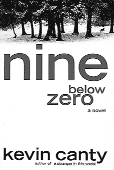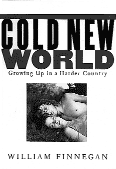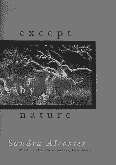Book Chat
by Susanna Sonnenberg
Nine Below Zero
by Kevin Canty '88, assistant professor of creative writing.
New York: Doubleday, 1999. 371 pp. $23.95.
 
Everyone in Kevin Canty's second novel is trying to escape something. Justine has left behind the unbearable haunt of a dead child; her grandfather, a former senator, is deciding between death and life; and Marvin Deernose wants to be able finally to come in from the cold and live a meaningful life.
These people forge a wreckage, connecting in ways that don't so much bring them any closer but convey the sadness of being alive. Set in an unforgiving Montana winter, Nine Below Zero redefines cold and snow, hot springs and fire building, icy passes and half-empty bars and the "pleasant sense of shelter, anyway, of calm and order and work."
Canty knows his territory, both the topographical and the spiritual. After Marvin and Justine, almost strangers, have just cheated on her husband, Canty writes: "Now it was Sunday morning and an empty 1.75 liter bottle of Black Jack lay on the counter and a line of pale blue light glowed around everything. A lot of whiskey, Marvin thought. There was a blank place at the end of last night. It seemed like they had tried to have sex again at the end of the whiskey but he couldn't remember how it had gone." Then Marvin steps outside into the "ragged snow" and regards the "red bark of the alders along the stream, the dirty gray foothills and then the mountains."
In prose that feels casual yet controlled, in dialogue that is terse and heavy with meaning, Canty takes us to the places his characters don't want to be, and this makes for a sorrowing sort of read, a low keening in the back of the reader's head, a pity for these people that is just and humane and riveting.
Cold New World: Growing Up in a Harder Country
by William Finnegan, M.F.A. '78.
New York: Random House, 1998. 421 pp. $26.00.
 
Who are we now and what does this mean we will become? That is the complicated question William Finnegan investigates with his bravura reporting in Cold New World. In four marvelously in-depth sections he explores America's youth, a culture, he concludes, of drugs and casual violence, poverty and television, families sprung free of any classic definition.
Writing from a self-confessed position of peace, comfort and stability, the author makes himself at home with a young New Haven drug dealer, a pair of second-generation Mexican-American children, suburban white supremacists in Los Angeles and a small-town Texas drug world. Each of these lives, we discover, shares much more than expected. "Social mobility in America runs in every direction," writes the author. "And these days it does not necessarily run upward."
Finnegan's conclusions are neither the surprise nor the value of this book. Cold New World captures privacy. It takes us into living rooms, front seats, romances and prison cells that are fantastically intimate, worlds inaccessible to the rest of us. With dazzling surges of prose, Finnegan renders every detail of these lives with the combined ferocity of a beat reporter, private investigator and documentary filmmaker.
Except by Nature
by Sandra Alcosser, M.F.A. '82.
Saint Paul, Minnesota: Greywolf Press, 1998. 70 pp. $12.95.
 
A dripping Louisiana is home for many of the rich and redolent poems in Sandra Alcosser's award-winning collection, Except by Nature. Even those poems set elsewhere or set nowhere steam with a milky swamp heat, seethe with a lavish cry.
In her opening section titled "Sugary Heat," the poems "Pole Boat on Honey Island" and "Azaleas" set a mood, a room, a stage--all inescapable--and the reader is drawn in by the suck and pull of Alcosser's luscious, palpable words. From the first poem comes this opening to the book:
The way he pushes deeper
into everything I hate--the heat rising
like wet crepe from silt to muck
to fill our lungs with its rotten breath.
This is followed by "Azaleas," a dense prose poem: "Night came on so strong there, the smear of color and funereal perfume, every bloom corpulent on flood and rain. My friend and I walked the Quarter eating butter pastry and oysters. Six feet tall, she glowed against the courtyard--Venus, a marble goddess, who tasted the world's saliva as if it were champagne." "We never touched," the speaker writes later in the piece. But the poet, who has given us the metallic champagne taste in our own mouths, knows otherwise. These poems quiver with touching, untouched and unspoken. This is the touching that words can do.
Words are fruit and meat in this book, flesh and sweat, thick soil, scented breasts. They are, under Alcosser's control, the vendors, the lovers, the dancers of language. Except by Nature is profoundly sensual. The second section, "Sweat," occupies itself more with introspection and denial, as one speaker, "stalled in traffic," sees herself in contrast to the "van of boys."
Then the book moves to the spare, dry Montana, the section titled "By the Nape" as understated as the earlier sections are dense. The "[g]ray cloud like a sweater pulled over the heart of the moon" is the tight feeling of night in "Skiing by Moonlight."
Often Alcosser's poems report, conveying someone else's narrative, bearing witness to the pains that make us human. The speaker gathers with a dead aunt, a dying grandmother or friends, as in "Michael's Wine."
We toast ourselves, our safety,
time the brandied savory
of late November.
Then Michael starts to tell his own story of a killing and transforms the poem.
Alcosser concerns herself with these invisible moments, these quiet turnings from one mood to another. And while we the readers are still savoring the succulent words she's offered, we find that the world all around us has changed.


|